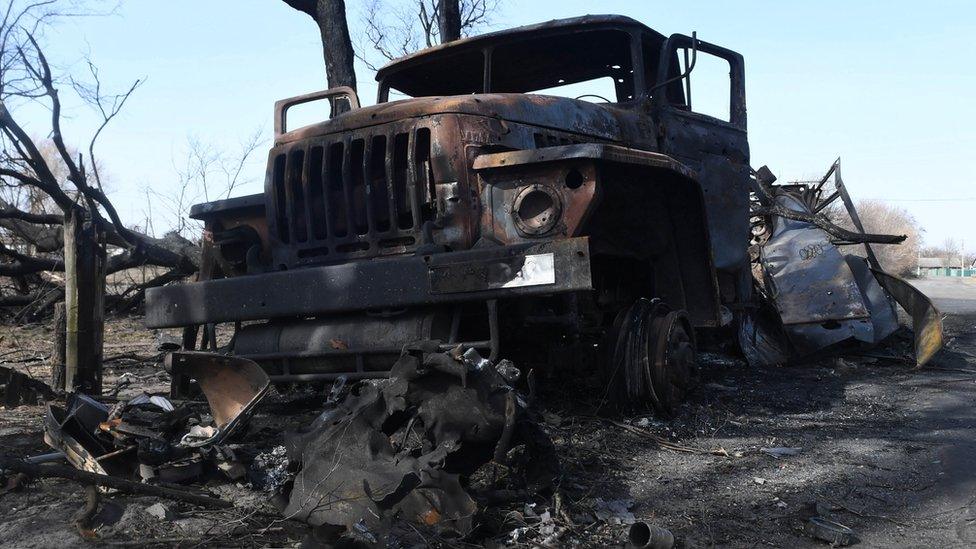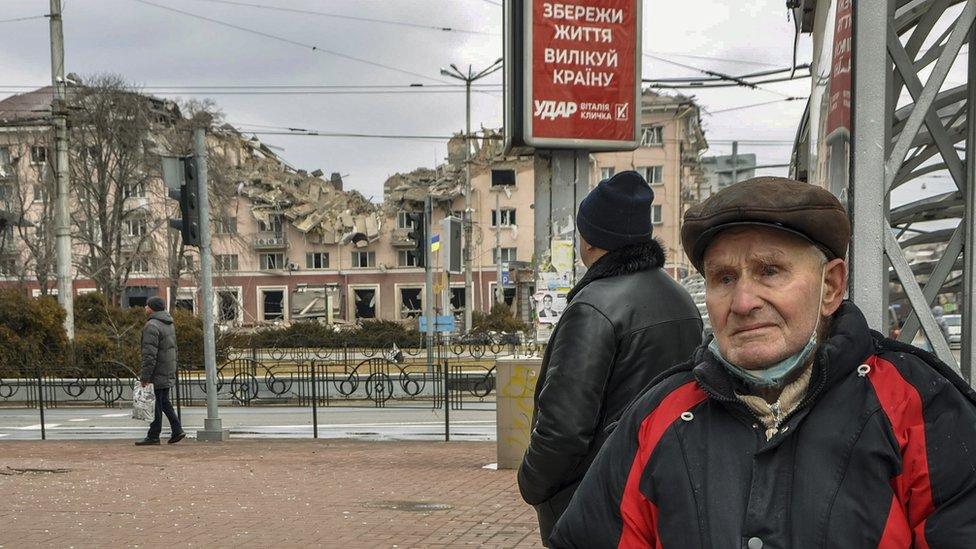War in Ukraine: Russia launches new attacks after peace promise
- Published

There has been no let-up in attacks on Ukraine's northern cities despite Russia's pledge to reduce military action, regional authorities say.
Russia said on Tuesday it would cut back operations around Chernihiv and the capital Kyiv in an effort to "boost mutual trust" in peace talks.
But the Chernihiv region's governor told the BBC attacks had continued overnight into Wednesday.
Ukraine also said there had been no mass removal of troops.
Oleksandr Motuzyanyk, a spokesperson for Ukraine's armed forces, said that though there had been a partial movement of troops from the directions of Kyiv and Chernihiv, they had yet to fully abandon attempts to seize, or at least surround these cities.
Later on Wednesday a US defence official said some Russian troops were leaving the Chernobyl area - home to a former nuclear plant that was the site of the world's worst nuclear accident in 1986.
"Chernobyl is [an] area where they are beginning to reposition some of their troops - leaving, walking away from the Chernobyl facility and moving into Belarus," the official said.
"We think that they are leaving, I can't tell you that they're all gone," the official added.
The decommissioned nuclear power station has been under Russian control since late-February, a move that has been subject to widespread international condemnation. There have also been concerns over the welfare of workers at the Chernobyl site.
The UN's Human Rights Commissioner Michelle Bachelet, meanwhile, said Russia's allegedly indiscriminate attacks on populated areas of Ukraine "may amount to war crimes".
Addressing the Human Rights Council in Geneva, Switzerland, on Tuesday, she said there were credible allegations that Russia had used cluster munitions in populated areas on multiple occasions. Such weapons are widely banned by an international treaty, but neither Russia nor Ukraine are signed up to it.
Her office has also verified 77 incidents in which medical facilities had been damaged - including 50 hospitals.
Russian attacks continue
To date, 350 civilians have been killed in the city, with 25 to 40 casualties arriving at the hospitals every day, Chernihiv's mayor told the BBC's Ukrainian Service.
Vladyslav Atroshenko said he never thought that, as mayor, he would ever have to look for extra fridges to store the bodies of the dead because the morgues are full.
He never thought he would have to look for additional teams of carpenters to make coffins, and for alternative places to bury the dead because the cemetery is too dangerous to travel to.
Local officials said Russian shelling continued to hit civilian infrastructure in the city.
"The entire night was pretty tense", regional governor Viacheslav Chaus told the BBC.
"They attacked Nizhyn and Chernihiv. Mostly Chernihiv. Again, part of the civilian infrastructure was destroyed."
"Chernihiv still has no electricity, water supply and heat. It won't be easy to restore this infrastructure. None of the military buildings were targeted last night. They kept attacking only civilian infrastructure," the governor said.
The BBC has not been able to confirm this independently, but residents of Chernihiv also said the fighting was continuing.
"This night was rough," one resident told the BBC. "We heard there was fighting all night in the suburbs, away from the city centre. We heard artillery. But there was no aviation tonight."
Another resident said shelling was continuing on Wednesday, although not as intensely as overnight.

Air raid sirens also sounded in Kyiv just a few hours after the announcement that troops would be reduced around the city.
Kyiv's deputy mayor, Mykola Povoroznyk, said the capital itself had not been shelled overnight, however gunfire had been heard from battles around the city.
US and Ukrainian officials say Russia is continuing to reposition forces away from Kyiv, probably as part of an effort to refocus on eastern regions.
Ukrainian forces have also made advances in recent days, retaking areas from Russian forces.
In Irpin, near Kyiv, the mayor said Ukrainian forces had retaken control of the town on Monday, and around 200 to 300 civilians had died in the town before it was retaken.
Developments on the ground come as Russian and Ukrainian negotiators made no "breakthroughs" in Tuesday's peace talks, the Kremlin said.

War in Ukraine: More coverage
SHOOTING: Does video show Ukrainian war crime?
READ MORE: Full coverage of the crisis, external

Delegations from Moscow and Kyiv held three hours of discussions in Istanbul on Tuesday aimed at bringing to a close more than a month of fighting in Ukraine.
Ukraine said it had proposed to become a neutral state in exchange for security guarantees. A key aim of Russia's invasion was to stop Ukraine joining the Nato alliance and Russian officials said the talks had moved to a practical stage.
Russia's pledge to cut back military activity was met with scepticism. "Ukrainians are not naïve people," President Volodymyr Zelensky said in an overnight video address.
Mr Zelensky said that initial signs from the peace talks were "positive", but added that they did not "drown out" the explosions of Russian shells.
Other countries also reacted with caution. US President Joe Biden said: "I don't read anything into it until I see what their actions are."
Leaders from UK, France, Germany and Italy also urged the West not to drop its guard against Russia.
In other developments:
Russian President Vladimir Putin has said that shelling of the besieged Ukrainian city of Mariupol will only end when Ukrainian troops surrender
Germany has declared an "early warning" over possible gas supply disruption amid a payments stand-off with Russia
More than four million people have now fled Ukraine to escape Russia's invasion, according to the latest United Nations figures.

What questions do you have about the Russian invasion of Ukraine?
In some cases your question will be published, displaying your name, age and location as you provide it, unless you state otherwise. Your contact details will never be published. Please ensure you have read our terms & conditions and privacy policy.
Use this form to ask your question:
If you are reading this page and can't see the form you will need to visit the mobile version of the BBC website to submit your question or send them via email to YourQuestions@bbc.co.uk, external. Please include your name, age and location with any question you send in.
Related topics
- Published30 March 2022
